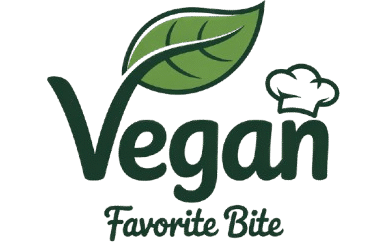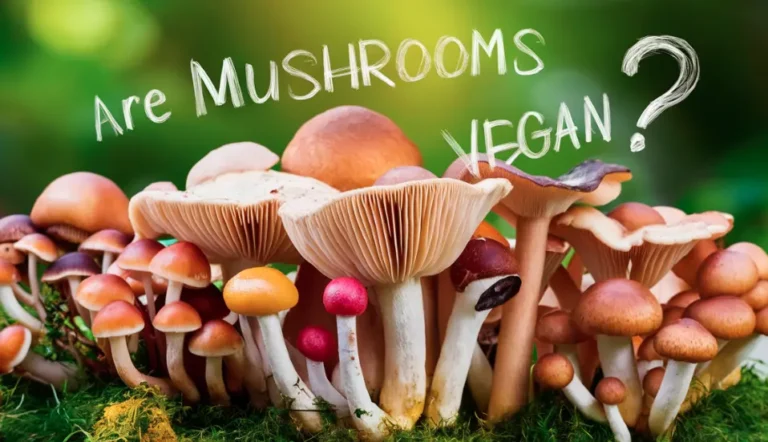Are Mushrooms Vegan? Mushrooms, a fascinating and versatile food, are often a topic of discussion in the vegan community. While they are widely consumed in vegan diets, questions sometimes arise about whether mushrooms truly align with vegan principles. To understand this, it’s essential to delve into both the definition of veganism and the nature of mushrooms.
What Does It Mean to Be Vegan?
Definition of Veganism
Veganism is a lifestyle choice and dietary practice that seeks to exclude the use of animals for food, clothing, or any other purpose. Vegans abstain from consuming meat, dairy, eggs, and other animal-derived ingredients. The philosophy often extends to avoiding products tested on animals or made from animal byproducts, such as leather and wool.
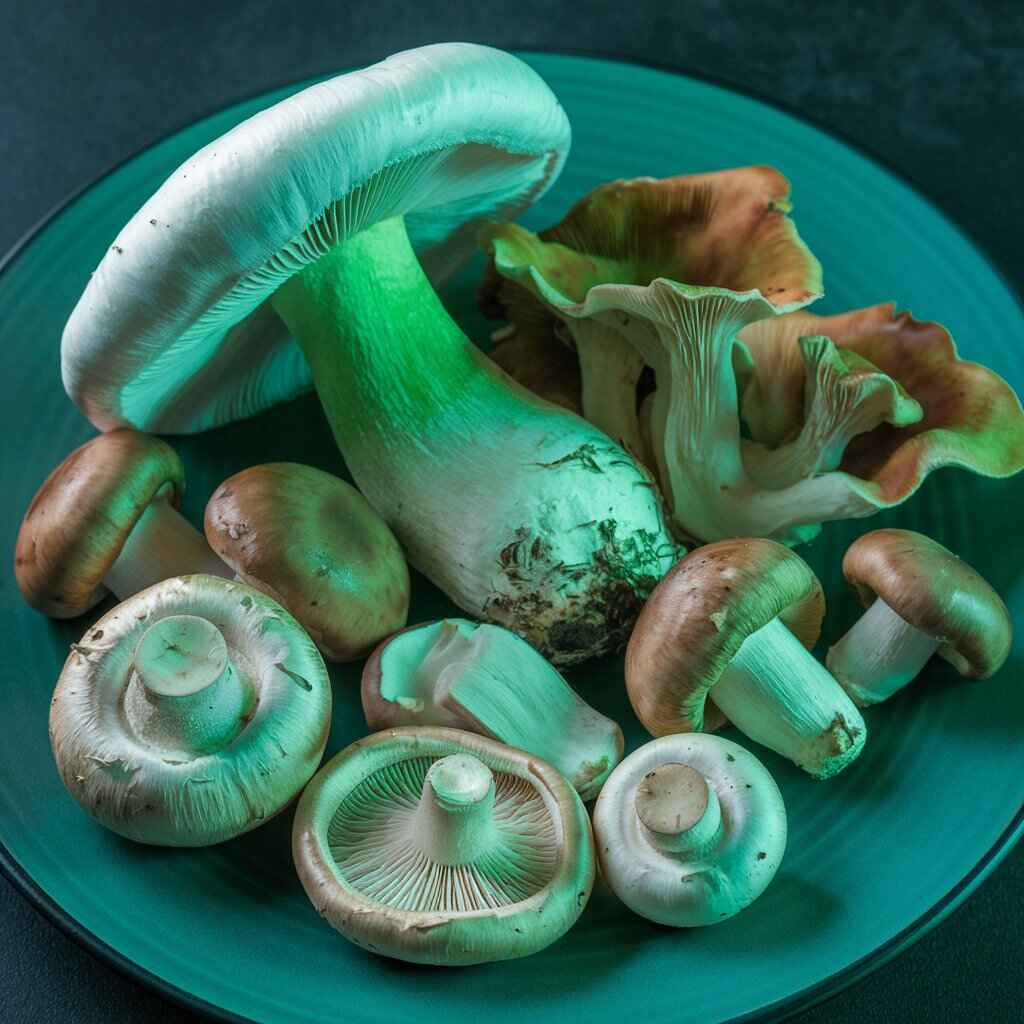
Common Food Exclusions in a Vegan Diet
Foods excluded in a vegan diet typically include:
- Animal flesh: Meat from mammals, poultry, and seafood.
- Animal-derived products: Dairy, eggs, and honey.
- Additives: Certain ingredients like gelatin, casein, and carmine, derived from animals.
Modern Therapeutic Applications
Recent studies highlight the health benefits of mushrooms, including immune support and anti-inflammatory properties. For a sweet twist, try Vegan Gluten-Free Chocolate Avocado Mousse for a healthy dessert.
What Are Mushrooms?
Biological Classification
Mushrooms are classified as fungi, a distinct kingdom of organisms separate from plants, animals, and bacteria. Unlike plants, fungi lack chlorophyll and do not photosynthesize. They obtain nutrients by decomposing organic material in their environment.
Types of Mushrooms
Mushrooms come in a wide variety of species, including:
- Edible mushrooms: Button mushrooms, portobello, shiitake, and oyster mushrooms.
- Medicinal mushrooms: Reishi and lion’s mane, valued for their potential health benefits.
- Wild mushrooms: Truffles and chanterelles, known for their unique flavors and textures.
- Sustainability Aspects : Mushrooms are sustainable due to their low water and land requirements. For more eco-friendly meal inspirations, check out 10 Easy Seasonal Vegan Recipes for spring and summer.
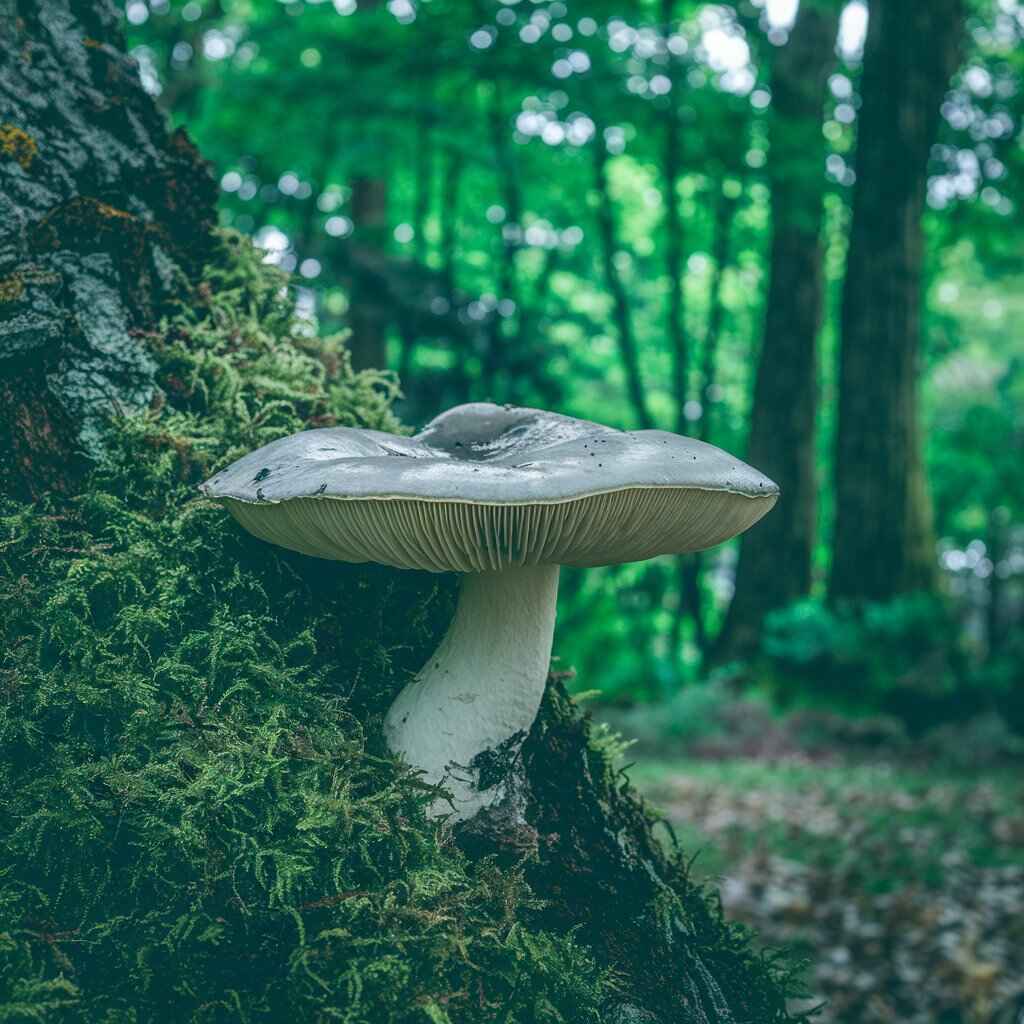
Their diversity and nutrient-rich profiles make them a popular choice in plant-based diets.
The Vegan Debate Around Mushrooms
Why Some Vegans Might Question Mushrooms
Although mushrooms are not animal-derived, some vegans question their vegan status due to certain practices associated with their cultivation. For example, some mushroom farms use animal-based fertilizers like manure, sparking debate among stricter vegans.
Ethical Concerns
From an ethical perspective, some vegans may also consider the environmental impact of mushroom farming, particularly when animal byproducts are involved. However, such concerns are not unique to mushrooms and are part of a broader discussion about agricultural practices in veganism.
Are Mushrooms Plants or Fungi?
Understanding Fungi
Fungi, including mushrooms, are unique organisms that differ fundamentally from plants and animals. They belong to their own kingdom and play a crucial ecological role by breaking down organic matter and recycling nutrients.
Key Differences Between Plants and Fungi
- Nutrition: Plants produce their own food through photosynthesis, while fungi absorb nutrients from external organic sources.
- Cell Walls: Fungal cell walls are made of chitin, a substance also found in insect exoskeletons, whereas plant cell walls are made of cellulose.
- Reproduction: Fungi reproduce through spores, often requiring specific environmental conditions, unlike the seeds of plants.
These distinctions emphasize that mushrooms are neither plant nor animal, positioning them uniquely in the context of veganism.
Mushrooms and Veganism
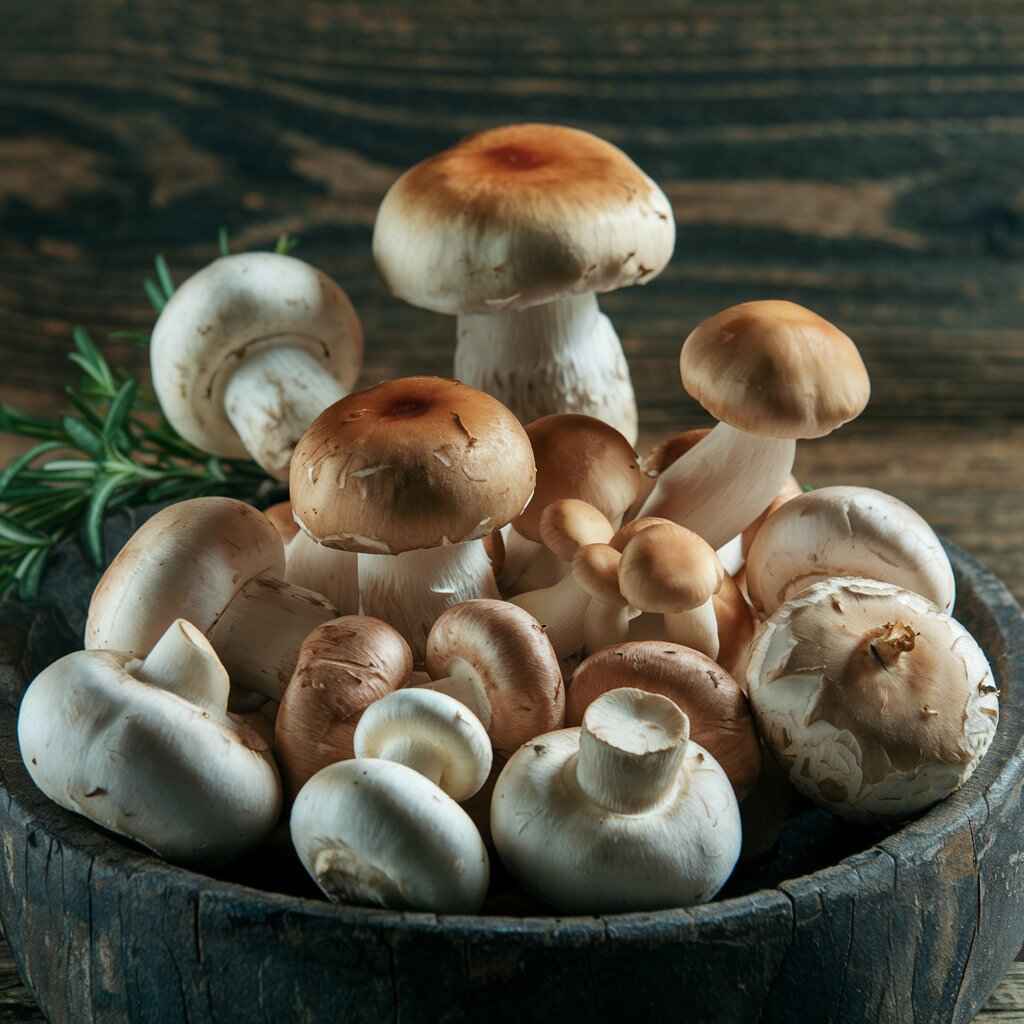
Mushrooms, a fascinating and versatile food, are often a topic of discussion in the vegan community. While they are widely consumed in vegan diets, questions sometimes arise about whether mushrooms truly align with vegan principles. To understand this, it’s essential to delve into both the definition of veganism and the nature of mushrooms.
What are mushrooms?
Biological Classification
Mushrooms are classified as fungi, a distinct kingdom of organisms separate from plants, animals, and bacteria. Unlike plants, fungi lack chlorophyll and do not photosynthesize. They obtain nutrients by decomposing organic material in their environment.
Types of Mushrooms
Mushrooms come in a wide variety of species, including:
- Edible mushrooms: Button mushrooms, portobello, shiitake, and oyster mushrooms.
- Medicinal mushrooms: Reishi and lion’s mane, valued for their potential health benefits.
- Wild mushrooms: Truffles and chanterelles, known for their unique flavors and textures.
Their diversity and nutrient-rich profiles make them a popular choice in plant-based diets.
The Vegan Debate Around Mushrooms
Why Some Vegans Might Question Mushrooms
Although mushrooms are not animal-derived, some vegans question their vegan status due to certain practices associated with their cultivation. For example, some mushroom farms use animal-based fertilizers like manure, sparking debate among stricter vegans.
Ethical Concerns
From an ethical perspective, some vegans may also consider the environmental impact of mushroom farming, particularly when animal byproducts are involved. However, such concerns are not unique to mushrooms and are part of a broader discussion about agricultural practices in veganism.
Are Mushrooms vegan? Plants or Fungi?
Understanding Fungi
Fungi, including mushrooms, are unique organisms that differ fundamentally from plants and animals. They belong to their own kingdom and play a crucial ecological role by breaking down organic matter and recycling nutrients.
Key Differences Between Plants and Fungi
- Nutrition: Plants produce their own food through photosynthesis, while fungi absorb nutrients from external organic sources.
- Cell Walls: Fungal cell walls are made of chitin, a substance also found in insect exoskeletons, whereas plant cell walls are made of cellulose.
- Reproduction: Fungi reproduce through spores, often requiring specific environmental conditions, unlike the seeds of plants.
These distinctions emphasize that mushrooms are neither plant nor animal, positioning them uniquely in the context of veganism
How Mushrooms Are Grown
Mushrooms are cultivated using various substrates such as straw, wood chips, compost, or agricultural waste, which provide the necessary nutrients for their growth. The process typically takes place in controlled environments where factors like temperature, humidity, and light are precisely regulated to optimize fungal development. These conditions ensure a consistent and high-quality yield, making mushroom farming an efficient agricultural practice.
Sustainability Aspects
Mushroom farming is considered highly sustainable due to its minimal resource requirements. Compared to other crops, mushrooms use less water, require less land, and can grow on byproducts of other agricultural processes. This ability to recycle organic materials not only reduces waste but also makes mushrooms an eco-friendly choice in the food system.
Ethical Farming Practices
Ensuring Cruelty-Free Farming
To align with vegan principles, many farmers adopt cruelty-free practices by avoiding the use of animal-derived fertilizers such as manure. Instead, they rely on plant-based composts or synthetic nutrients to cultivate mushrooms. These practices help ensure that the farming process does not exploit animals, making mushrooms suitable for stricter vegans.
Avoiding Exploitation in Mushroom Farming
Ethical farming also considers the welfare of farmworkers and the environmental impact of the cultivation process. By promoting fair labor practices and sustainable methods, mushroom farms can provide a product that supports both ethical consumption and ecological balance.
Mushrooms’ Role in a Vegan Diet
Nutritional Benefits
Mushrooms are a powerhouse of nutrients, offering essential vitamins, minerals, and antioxidants. They are particularly rich in B vitamins, selenium, potassium, and dietary fiber. Certain varieties, such as those exposed to sunlight or UV light, can also provide vitamin D, a nutrient often lacking in vegan diets. This makes mushrooms an important addition for maintaining overall health and well-being.
Versatility in Recipes
One of the standout qualities of mushrooms is their culinary versatility. Their unique umami flavor and meaty texture make them a popular ingredient in vegan cooking. Mushrooms can be sautéed, grilled, roasted, or used as a base for soups, stews, and sauces. They are also a key component in plant-based meat substitutes, offering a satisfying alternative to animal products.
Environmental Impact of Mushrooms
Low Carbon Footprint
Mushroom cultivation is celebrated for its low environmental impact. The production process generates a smaller carbon footprint compared to many other food sources, including other plant-based options. Mushrooms grow quickly, use minimal resources, and produce negligible waste, making them an eco-conscious choice for sustainable eating.
Comparison to Other Vegan Foods
Compared to staples like nuts, grains, and legumes, mushrooms stand out for their efficient use of water and land. They can be grown vertically, maximizing space in urban farming or greenhouse setups. These factors make mushrooms a particularly sustainable addition to a vegan diet, complementing other eco-friendly food choices.
Medicinal Uses of Mushrooms
Traditional Medicine
Mushrooms have a long history of use in traditional medicine across cultures. Varieties like reishi, chaga, and cordyceps are renowned for their adaptogenic properties, which are believed to boost the immune system, enhance energy levels, and reduce stress. These traditional applications continue to influence modern interest in their therapeutic potential.
Modern Therapeutic Applications
Recent research highlights the potential of mushrooms in modern medicine. Compounds such as beta-glucans and polysaccharides found in mushrooms are being studied for their role in supporting immune health, reducing inflammation, and even fighting certain types of cancer. As science continues to explore their medicinal properties, mushrooms are becoming an integral part of holistic health approaches..
Popular Vegan Recipes Featuring Mushrooms
Mushrooms are a culinary treasure in vegan cooking, thanks to their rich umami flavor and versatile texture. Here are some standout dishes and insights into their cultural significance:
Examples of Dishes
- Mushroom Stroganoff
A creamy, comforting dish made with sautéed mushrooms, plant-based cream, and herbs, served over pasta or rice. - Stuffed Portobello Mushrooms
Large portobello caps filled with a mixture of breadcrumbs, herbs, and vegetables, then baked to perfection. - Mushroom Risotto
Arborio rice cooked in a rich mushroom broth, creating a creamy and satisfying main course. - Vegan Mushroom Burgers
Patties crafted from mushrooms, beans, and grains, grilled or baked for a hearty burger option. - Mushroom Tacos
Spiced mushrooms as a filling for soft tortillas, topped with avocado, salsa, and vegan cheese. - Miso Mushroom Soup
A light yet flavorful broth-based soup featuring mushrooms, miso, and green onions.
Cultural Significance
Mushrooms hold a special place in global cuisine:
- Asian Cuisine: Shiitake and enoki mushrooms are staples in dishes like ramen, stir-fries, and hot pots.
- European Cuisine: Chanterelles and porcini are celebrated in Italian and French dishes, particularly in pastas and stews.
- American Cuisine: Portobello mushrooms often replace meat in burgers, showcasing their adaptability in plant-based diets.
Mushrooms’ ability to absorb flavors makes them invaluable in replicating traditional meat dishes, bridging cultural gaps in vegan cooking.
FAQs: Are Mushrooms Vegan?
1. Are all mushrooms vegan?
Yes, most mushrooms are vegan as they are fungi and do not contain animal-derived ingredients. However, foraging methods like truffle hunting may raise ethical concerns for some vegans.
2. What nutritional benefits do mushrooms provide?
Mushrooms are rich in vitamins like B2 and D, minerals like selenium, and antioxidants. They also provide protein and fiber, making them a valuable addition to a vegan diet.
3. Do mushrooms have a low environmental impact?
Absolutely. Mushrooms require minimal water, land, and energy compared to animal farming, making them a sustainable food choice.
Conclusion: Are Mushrooms Vegan?
Mushrooms are a fantastic fit for vegan diets, offering unmatched versatility, nutrition, and sustainability. Whether enhancing dishes with their deep flavors or serving as a meat alternative, mushrooms are a cornerstone of plant-based cuisine. Their cultural and environmental significance further solidifies their place on the vegan plate. By choosing mushrooms, vegans can enjoy a delicious, ethical, and eco-friendly food source that celebrates nature’s bounty.
